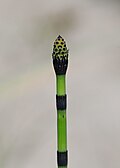Equisetum hyemale
Equisetum hyemale, commonly known as rough horsetail or scouring rush, is a perennial herbaceous plant in the Equisetaceae family. It is native to North America, Europe, and northern Asia, and can be found in diverse habitats, including wetlands, forests, and meadows.
Description
Equisetum hyemale is characterized by its green, rough, jointed and hollow stems that can grow up to 1.5 meters tall. Unlike most other species in its genus, it does not produce separate fertile and sterile stems. The stems are covered with tiny, black-toothed sheaths and the plant lacks true leaves and flowers. Instead, it reproduces through spores, which are produced in cone-like structures at the tips of the stems.
Habitat and Distribution
Equisetum hyemale is a cosmopolitan species, found in a wide range of habitats across North America, Europe, and northern Asia. It is particularly common in wetlands, but can also be found in drier upland forests and meadows. The plant prefers acidic soils and can often be found in areas disturbed by human activity, such as roadsides and ditches.
Uses
Historically, the rough stems of Equisetum hyemale have been used for scouring and polishing metal and wood, hence the common name "scouring rush". The plant is also used in traditional medicine for its diuretic and astringent properties. In modern times, it is often used in landscaping for its attractive, architectural form and its ability to stabilize soil.
Cultivation
Equisetum hyemale is a hardy plant that can tolerate a range of conditions, but prefers full sun to partial shade and wet to moist soils. It can be propagated by division in spring or by spores. Care should be taken when planting Equisetum hyemale as it can become invasive in favorable conditions.
Conservation
While Equisetum hyemale is not currently considered threatened, its habitat is being lost to development and pollution. Conservation efforts are focused on protecting its wetland habitats and controlling invasive species that compete with it for resources.
Transform your life with W8MD's budget GLP-1 injections from $125.
W8MD offers a medical weight loss program to lose weight in Philadelphia. Our physician-supervised medical weight loss provides:
- Most insurances accepted or discounted self-pay rates. We will obtain insurance prior authorizations if needed.
- Generic GLP1 weight loss injections from $125 for the starting dose.
- Also offer prescription weight loss medications including Phentermine, Qsymia, Diethylpropion, Contrave etc.
NYC weight loss doctor appointments
Start your NYC weight loss journey today at our NYC medical weight loss and Philadelphia medical weight loss clinics.
- Call 718-946-5500 to lose weight in NYC or for medical weight loss in Philadelphia 215-676-2334.
- Tags:NYC medical weight loss, Philadelphia lose weight Zepbound NYC, Budget GLP1 weight loss injections, Wegovy Philadelphia, Wegovy NYC, Philadelphia medical weight loss, Brookly weight loss and Wegovy NYC
|
WikiMD's Wellness Encyclopedia |
| Let Food Be Thy Medicine Medicine Thy Food - Hippocrates |
Medical Disclaimer: WikiMD is not a substitute for professional medical advice. The information on WikiMD is provided as an information resource only, may be incorrect, outdated or misleading, and is not to be used or relied on for any diagnostic or treatment purposes. Please consult your health care provider before making any healthcare decisions or for guidance about a specific medical condition. WikiMD expressly disclaims responsibility, and shall have no liability, for any damages, loss, injury, or liability whatsoever suffered as a result of your reliance on the information contained in this site. By visiting this site you agree to the foregoing terms and conditions, which may from time to time be changed or supplemented by WikiMD. If you do not agree to the foregoing terms and conditions, you should not enter or use this site. See full disclaimer.
Credits:Most images are courtesy of Wikimedia commons, and templates, categories Wikipedia, licensed under CC BY SA or similar.
Contributors: Prab R. Tumpati, MD



